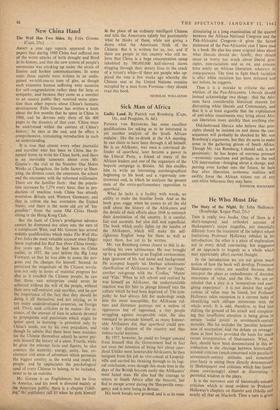Sick Man of Africa
Guilty Land. By Patrick van Rensburg. (Cape, 18s., and Penguins, 3s. 6d.)
PATRICK VAN RENSBURG has some excellent qualifications for asking us to be interested in yet another analysis •of the South African malaise: like the ex-drunk at the AA meeting, he can claim to have been through it all himself. He is an Afrikaner, was once a convinced de- fender of apartheid, later became a power in the Liberal Party, a friend of many of the African leaders and one of the organisers of the boycott campaign in Britain. All this enables him to write an interesting autobiographical beginning to his book and a vigorously con- troversial end, in which he analyses the present state of the extra-parliamentary opposition to apartheid.
What he lacks is a facility with words, an ability to make the familiar fresh. And so the book goes soggy when he comes to all the old stuff about the history of the Afrikaners and the details of their efforts since 1948 to entrench their domination of the country. It is careful, fair and accurate, but also dull and superficial. The book which really lights up the insides of the Afrikaners, which will make the self- righteous English weep for them as well as reject them, has yet to be written.
Mr. van Rensburg comes closest to this in de- scribing his own adolescence. He was brought up by a grandmother in an English environment, kept ignorant of his real name and background. He accepted happily his Durban schoolmates' classification of Afrikaners as 'Boets' or limps,' another out-group with the • 'Coolies,"Munts' and 'Yids.' When he left school and realised he was himself an Afrikaner, the understandable reaction was for him to plunge himself into the culture which he had been deprived of. The sym- pathy he had always felt for underdogs made him the more susceptible, for Afrikaans cul- ture and literature portrays not a nation of oppressors but of oppressed, a tiny people struggling against insuperable odds. He also managed to persuade himself, as many honour- able Afrikaners did, that apartheid could pro- vide a fair division of the country and thus reduce racial tensions.
By 1957, however, he could no longer conceal from himself that the Government had in fact not even the intention of being fair about apar- theid. Unlike most honourable Afrikaners, he then resigned from his job as vice-consul at Leopold- ville and carried his thinking through to its logi- cal conclusion, even though this made him in the days of the British boycott easily the Afrikaners' most hated man. He also had the courage to return to South Africa after the boycott, but fled to escape arrest during the Sharpeville emer- gency and is now living in Britain.
His book breaks new ground, and is at its most stimulating in a long examination of the quarrel between the African National Congress and the Pah-Africanist Congress—it gives the fairest statement of the Pan-Africanist case I have read in a book. He also has some original ideas about what liberals should do: briefly, they should cease to worry too much about liberal prin- ciples, non-racialism and so on, and concen- trate solely on African liberation, whatever its consequences. The time to fight black racialism is after white racialism has been defeated and not before, he suggests.
Thus it is a mistake to criticise the anti- whitism of the Pan-Africanists. Liberals should instead acknowledge two things: that the Afri- cans have considerable historical reasons for distrusting white liberals and Communists, and that it is at least arguable that the exploitation of anti-white resentments may bring about Afri- can liberation more quickly than anything else.
Old-fashioned liberals who believe that prin- ciples should be insisted on and damn the con- sequences will probably be shocked by Mr. van Rensburg's arguments, but they do seem to make sense in the gathering gloom of South Africa. Though Mr. van Rensburg, I should add, is not pessimistic: he has hopes of overseas pressure —economic sanctions and perhaps in the end UN intervention—bringing about a change, and, peering even farther into the future, he feels that after liberation economic realities will swiftly force the African victors out of any anti-white bitterness they may have.
KENNETH MACKENZIE






























 Previous page
Previous page